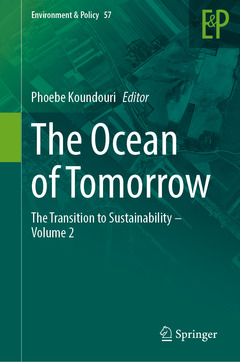The Ocean of Tomorrow, 1st ed. 2021 The Transition to Sustainability - Volume 2 Environment & Policy Series, Vol. 57
Coordonnateur : Koundouri Phoebe

As a response to the climate crisis and its effect on marine ecosystems and coastal populations, this book proposes concrete science driven solutions at establishing transformation pathways towards Sustainable Blue Growth, that are supported by technically and socially innovative innovations.
This book proposes investment options and management solutions that have the potential of making our seas and oceans resilient to crises- climate, financial, health- by laying the foundations for a green/blue, circular economy that is anchored in science driven solutions and geared toward public well-being. Now is the time to usher in systemic economic change and the good news is that we have our blueprint: it?s the combination of UN Agenda 2030 (17 SDG) and European Commission?s European Green Deal!
There is no doubt that the Earth?s survival will depend on the protection and sustainable management of our seas and oceans and the resources they provide. This is recognized by the Joint Communication on International Ocean Governance, which is an integral part of the EU?s response to the United Nations? 2030 Agenda for Sustainable Development, and in particular to the targets set out by Sustainable Development Goal 14 (SDG 14) to ?conserve and sustainably use the oceans, seas and marine resources?.
The analytical framework and science-driven concrete management solutions proposed in this book can accelerate the transition to a sustainable management of our seas and oceans, by turning the current challenges into opportunities for sustainable economic growth which is both environmentally resilient and leaves no one behind.
Corresponding author: Phoebe Koundouri
Other Authors: Vassiliki Manoussi, Lydia Papadaki
Chapter 2: Stakeholder involvement in technological design: Lessons learned from the MERMAID and TROPOS projects
Corresponding author: Marian Stuiver
Other Authors: Sander van den Burg, Wenting Chen, Claire Haggett, David Rudolph,
Chapter 3: Comparative Financial Analysis of marine multi-purpose platforms projects: MERMAID and TROPOS projects
Corresponding author: Saúl Torres-OrtegaOther Authors: Pedro Díaz-Simal, Fernando Del-Jesus, Raúl Guanche, Phoebe Koundouri
Chapter 4: Social acceptance and socioeconomic effects of Multi-Use Offshore Developments: Theory and Applications in MERMAID and TROPOS projects
Corresponding author: Wenting Chen
Other Authors: Phoebe Koundouri, Osiel González Dávila, Claire Haggett , David Ruldoph , Shiau-Yun Lu , Chia-Fa Chi 8, Jason Yu8, Lars Golmen1, Yung-Hsiang Ying
Chapter 5: An interdisciplinary web-based Decision Support System for socio-economic assessment of marine investments: The MERMAID projectCorresponding author: Evita Mailli
Other Authors: Petros Xepapadeas, Phoebe Koundouri
Chapter 6: Techno- and socio-economic models of production with application to aquaculture: Results from the BlueBRIDGE Project
Corresponding author: Gerasimos Antzoulatos
Other Authors: Charalampos Dimitrakopoulos , Eleni Petra, Stella Tsani, Phoebe Koundouri
Chapter 7: Increasing land-sea synergies and coastal-rural collaboration for a healthy ocean: The COASTAL project
Corresponding author: Ebun AkinseteOther Authors: Alice Guittard, Phoebe Koundouri
Chapter 8: Monetary and Non-Monetary Valuation of Cultural Ecosystem Services in Marine Protected Areas
Corresponding author: Lydia Stergiopoulou
Other Authors: Phoebe Koundouri, Achilleas Vassilopoulos
Chapter 9: Tackling single-use-plastic products in the Easter Mediterranean Sea: The BL.EU Climate and MedFreeSup projects
Corresponding author: Phoebe Koundouri
Other Authors: Lydia Papadaki, Alice Guittard, Elias Demian , Ebun Akinsete
Chapter 10: Sustainable Shipping: Levers of Change
Corresponding author: Andreas Papandreou
Other Authors: Phoebe Koundouri, Lydia Papadaki
Chapter 11: New Challenges and Opportunities for Sustainable Ports: The Deep Demonstration in Maritime Hubs project
Corresponding author: Vera Alexandropoulou
Other Authors: Phoebe Koundouri, Lydia Papadaki, Klimanthia KontaxakiChapter 12: Circular Economy in National Smart Specialization Strategies: The case of Greece
Corresponding author: Lena Tsipouri
Other Authors: Lydia Papadaki, Maria D. Argirou, Phoebe Koundouri
Chapter 13: Conclusions and Recommendations
Corresponding author: Phoebe Koundouri
Other Authors: Lydia Papadaki
The Volume Editor, Professor Dr. Phoebe Koundouri holds a PhD and MPhil in Economics and Econometrics from the University of Cambridge (UK). She is Professor (Chair) of Sustainable Development (Economics and Econometrics) at the School of Economics, Athens University of Economics and Business (Greece) and she is the elected President of the European Association of Environmental and Natural Resource Economists (EAERE) (with more than 1200 scientific member institutions, from more than 75 different countries). Prof. Koundouri is listed in the 1% of most-cited women economists in the world, with 15 published books and more than 250 published scientific papers. She also edited volume 1 of "The Ocean of Tomorrow" with subtitle "Investment Assessment of Multi-Use Offshore Platforms: Methodology and Applications" (ISBN 978-3-319-55770-0) which was published by Springer in 2017.
Prof. Phoebe Koundouri is also the Founder and Scientific Director of the Research laboratory on Socio-Economic and Environmental Sustainability (ReSEES) at the Athens University of Economics and Business and an affiliated Professor at the ATHENA Research and Innovation Center (Greece) where she directs EIT Climate-KIC Hub Greece of the European Institute of Innovation and Technology. She is also the co-chair of the United Nations Sustainable Development Network Greece (UN SDSN Greece), chair of the Scientific Advisory Board of the International Centre for Research on the Environment and the Economy (ICRE8) and chair of the scientific advisory board of the European Forest Institute.
Proposes analytical framework accelerating transition to sustainable management of our seas and oceans
Offers science-driven concrete management solutions
Turns challenges presented by oceans and seas into opportunities for sustainable economic growth
Proposes measures to improve the efficiency of maritime research
Aims to improve our understanding of marine ecosystems’ response to natural and anthropogenic factors
Date de parution : 12-2020
Ouvrage de 257 p.
15.5x23.5 cm
Thèmes de The Ocean of Tomorrow :
Mots-clés :
Sustainable oceans; Multi-use offshore platforms; Maritime activities; Marine Ecosystems; Marine Protected Areas; Deep Demonstrations; Systems Innovation Approach; Socio-Economic Efficiency; Social Inclusiveness; Sustainable Development Goals; European Green Deal; SDG 14 Life Below Water


